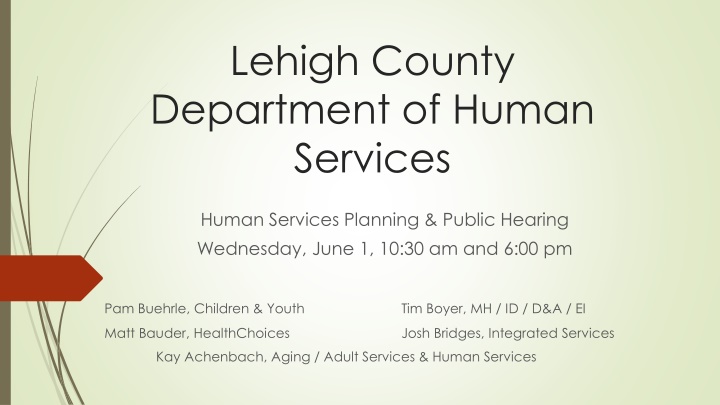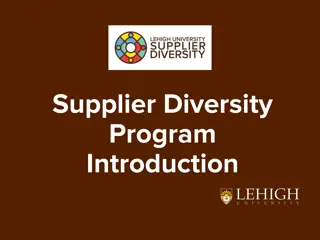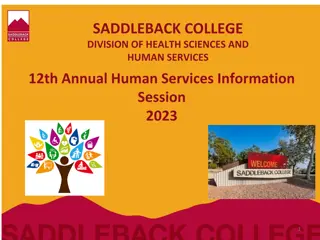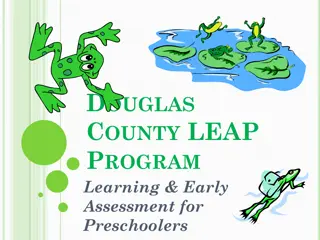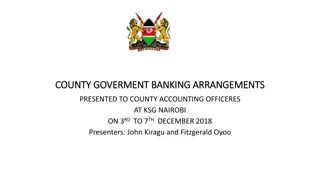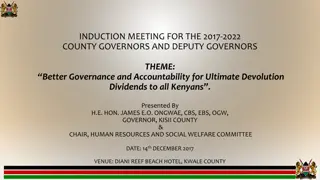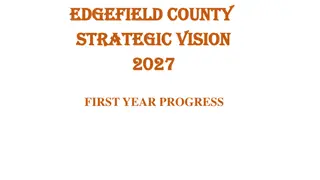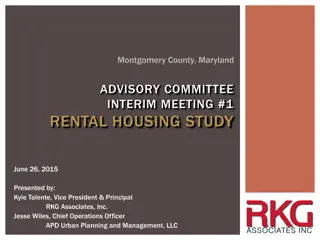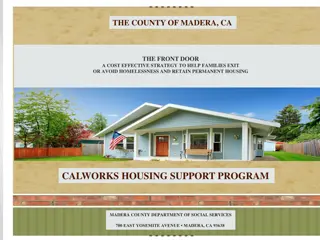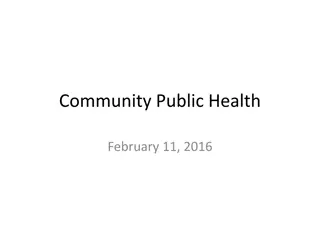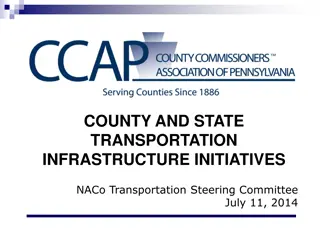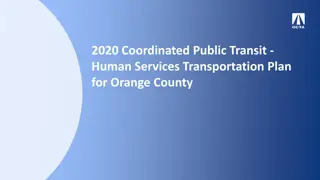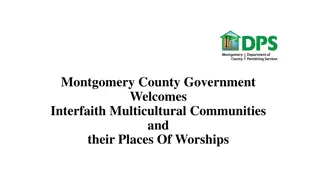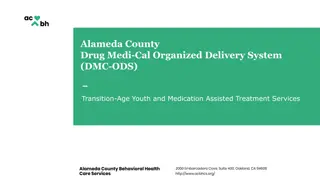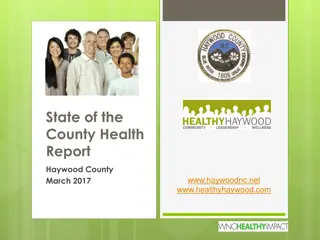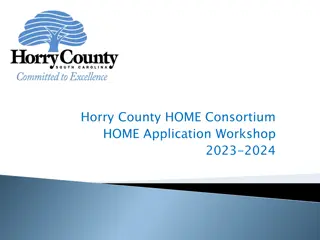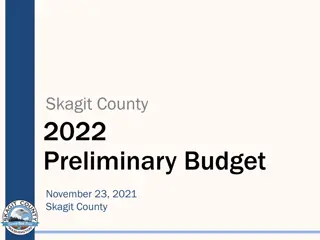Lehigh County Department of Human Services Overview
Lehigh County Department of Human Services provides a wide range of human services to assist individuals in difficult life situations. These services are designed to help people navigate through crises and chronic situations, empowering them to regain personal power and self-sufficiency. The department collaborates with various agencies and partners to deliver interdisciplinary services tailored to meet the needs of the community. Key areas of focus include aging and adult services, children and youth services, mental health, drug and alcohol support, and HealthChoices. The department's budget allocation and expenditure breakdown reflect a commitment to supporting these vital services, showcasing a dedication to enhancing the well-being of county residents.
Download Presentation

Please find below an Image/Link to download the presentation.
The content on the website is provided AS IS for your information and personal use only. It may not be sold, licensed, or shared on other websites without obtaining consent from the author.If you encounter any issues during the download, it is possible that the publisher has removed the file from their server.
You are allowed to download the files provided on this website for personal or commercial use, subject to the condition that they are used lawfully. All files are the property of their respective owners.
The content on the website is provided AS IS for your information and personal use only. It may not be sold, licensed, or shared on other websites without obtaining consent from the author.
E N D
Presentation Transcript
Lehigh County Department of Human Services Human Services Planning & Public Hearing Wednesday, June 1, 10:30 am and 6:00 pm Pam Buehrle, Children & Youth Tim Boyer, MH / ID / D&A / EI Matt Bauder, HealthChoices Josh Bridges, Integrated Services Kay Achenbach, Aging / Adult Services & Human Services
What Are Human Services? Designed to assist people in difficult life situations Interdisciplinary Services help people navigate through crisis or chronic situations where external help and guidance are needed for them to move forward with their lives and rediscover their personal power and self sufficiency Not Welfare
State Charge & Partnership State charges counties to assist in the delivery of Human Services HS model varies by county Counties can tailor their system as best meets the needs of citizens Some typical HS activities are completely optional (County Homes, ie) and others are mandated
2016 Lehigh DHS Budget Aging - Adult Svs 7.0% Children & Youth 18.1% ID - EI 5.5% Mental Health 9.7% Drug & Alcohol 3.2% HealthChoices 56.5%
DHS Expenditure Budget Personnel, Operating, Purchased Services Operating 1.1% Personnel 15.6% Purchased Services 83.3%
2016 Revenue by Source County 3.6% Program 0.2% HSBG is 14% of Lehigh s 2016 Intergovernmental Revenue, and 13.6% of Total Revenue Intergovernmental 96.2%
Mental Health Over 2,300 unduplicated county residents received county-funded mental health services An outreach, community-based mental health program intake program was initiated at the St Paul s Soup Kitchen The Fairweather Lodge, an evidenced-based recovery oriented housing program, was started for eight individuals Seven individuals will be moving from Wernersville State Hospital to the community and the beds at WeSH will be closed 18 police officers, representing 9 departments in the County, were trained as Crisis Intervention Team (CIT) officers, over 50 officers trained in total
Mental Health The 8thSt Moderate Care CRR was converted into the region s first Fairweather Lodge The SPORE Unit served 227 people with a recidivism rate for new charges of 7.4% 40 people were diverted from going to Wernersville State Hospital by being effectively supported in the community The Blended Case Management program (BCM) provided case management to 120 adults with severe and persistent mental illness. Assisting them with access to treatment to help reduce inpatient hospitalizations, reduce homelessness and improve consumer independence in the community.
Children & Youth Services PROTECTING CHILDREN STRENGTHENING FAMILIES
REFERRALS TO the OFFICE OF CHILDREN AND YOUTH SERVICES 2015 1402 General Protective Services Child Abuse 8596
Out of Home Placement by type 4/16/2016 (total placements 205) 38 66 Foster Specialized Foster IL Group 64 CRR/RES 25 Kinship 5 7
FAMILY GROUP DECISION MAKING 2015 number of conferences held in 2015 = 77 79 children served Plans developed 229
FAMILY FINDING 2015 total Family Finding cases - 231 33 232 Discovery Phase Connections Established Placement with Kin 3889
Truancy and Absenteeism Prevention Children s Roundtable Education Success and Truancy Prevention Committee Universal focus Prevention/Early Intervention OCYS and ASD truancy program Includes 9 elementary schools in the Allentown School District; Whitehall-Coplay School District and Norther Lehigh School District OCYS-funded elementary school, home, and community-based outreach to families re: truancy
School Out of Home Placement Practices for school aged children County-Wide Enrollment Training Enrollment Brochure Outreach to School Superintendents Directory of Contacts Transition Planning Cross-County Meeting of Schools, OCYS, Providers Enrollment brochure Points of contact
Comfort Cottage, a Family Engagement Center and Visit Coaching Grand opening April 2016 Serving children and Families working toward reunification Every family whose child enters out of home care is assigned a visit coach Enhances child / caregiver relationships Trauma assessments completed for children entering out of home care
EARLY HEAD START SAFESTART PROGRAM A collaboration between Community Services for Children and OCYS Two full sites West Allentown (old state hospital grounds) East Allentown (LVH 17thand Chew) adding Lehigh Valley Hospital as a third collaborative partner Providing all day supportive care for 64 children who are identified as drug impacted at birth Parent education and support Following children ages 0-3 who then can transition into the Head Start program allowing for continuum of care
Drug & Alcohol Treatment of heroin and opioid addiction accounts for more SCA funds than any other substance. From January 1, 2016 to May 19, 2016 there have been 59 probable drug related deaths mostly attributed to opioid abuse. Lehigh County HOPE (Heroin & Opioid Prevention Education) - over 8,000 middle/high school students and 1,000 community members will have participated by June 30th. Over 250 naloxone kits have been delivered into the community! CHOICES Lehigh County s nationally recognized school based intervention program continues to expand into Lehigh County Schools . Student Assistance Program (SAP) 667 LOC assessments completed as of May 15th, 188 D&A/Dual related and 429 MH related dispositions. Facilitated over 873 criminal justice referrals and 187 child welfare (OCYS/JPO) referrals.
Drug & Alcohol Student Assistance Program (Annually) Average of 750 middle and high school students assessed. Approximately 60% identified as needing MH treatment and 40% identified as needing D&A or Dual (D&A with co-occurring MH). Approx. 90% of the students needing D&A interventions receive the service needed. Assessments and Drug of Choice Up until 2014, alcohol was consistently the #1 driver of treatment costs. Since 2014, heroin has taken over the top spot (by a convincing margin), followed by: Alcohol, Marijuana, Cocaine and Synthetics.
HealthChoices Provides for medically necessary behavioral health services to Medical Assistance enrolled Lehigh County residents through contracts with either a Behavioral Health or Physical Health Managed Care Organization (MCO). Federally funded through the Center for Medicaid Services (CMS); funding is passed through the state to each individual County in Pennsylvania. In 2015, the Lehigh County HealthChoices program provided behavioral health services to 15,800 unduplicated members accounting for $56.52 million in medical claims costs. The HealthChoices program is always looking to be innovative and create new programs that will meet the growing and changing needs of our members.
HealthChoices Examples of Innovative Programming in HealthChoices Dual Diagnosis Treatment Team (DDTT) A voluntary, community-based, direct service that provides intensive supports to members with a dual Mental Health/Intellectual Disability diagnosis. This program provides an all- inclusive, collaborative, continuum of care model that addresses the needs of the member from a whole person perspective, assisting the member, his/her family, providers, and other community and natural supports with the skills to manage symptoms and behaviors that would place the member at risk for more restrictive levels of care. Transition to Independence (TIP) Case Management A transitional age case management program developed specifically for youth and young adults. This program focuses on engaging the member in their future planning process and building on strengths to enable the member to pursue their goals across relevant transition domains. The primary domains that are focused on include employment/career, educational opportunities, living situation, personal effectiveness/wellbeing, and community life functioning.
Aging & Adult Services Nearly 4,300 (unduplicated) Aging consumers received direct services and/or congregate meals (PDA) Over 700 consumers/families received vouchers for rental assistance (HSBG) Nearly 400 consumers 18-59 received intensive care management, direct services, and service planning/care management (HSBG) Continuing change in the Aging program .
Medicaid LTSS System Before April 1, 2016 ASSESSMENT / LEVEL OF CARE ATION MENT FINANCIAL DETERMIN- SERVICE COORDIN- ATION ENROLL- OTHER LTC SERVICES OPTIONS COUNSELING Under 60 AAAs CAOs Maximus Other Other Other 60+ AAAs CAOs AAAs AAAs AAAs Other Other 4/4/16 PA Association of Area Agencies on Aging AAA Area Agencies on Aging CAO County Assistance Offices LTC Long Term Care
Medicaid LTSS System After April 1, 2016 ASSESSMENT / LEVEL OF CARE ATION MENT FINANCIAL DETERMIN- SERVICE COORDIN- ATION ENROLL- OPTIONS COUNSELING OTHER LTC SERVICES Under 60 CAOs Maximus Other Other AAAs Maximus 60+ AAAs CAOs Maximus AAAs Other Other Maximus 4/4/16 PA Association of Area Agencies on Aging AAA Area Agencies on Aging CAO County Assistance Offices LTC Long Term Care
Medicaid LTSS System Under CHC FINANCIAL DETERMIN- ATION OPTIONS COUNSELING CLINICAL ELIGIBILITY DETERMINATION ENROLLMENT & MCOs Under 60 Aging Well CAOs IEE LTC Service Administrative Other Billing Payments Contracts Service Coordination NF Adult Day Cognitive Rehab Home Health Personal Care MCO Aging Well 60+ CAOs IEE Contract Out AAAs Other AAA Area Agencies on Aging CAO County Assistance Offices LTC Long Term Care IEE Independent Enrollment Entity MCO Managed Care Organization CHC Community HealthChoices 4/4/16 PA Association of Area Agencies on Aging
Aging Goals, Objectives & Strategies PROMOTE EXISTING SERVICES by increasing awareness of existing services, particularly prevention. Partner with existing resources to reach more consumers. Result in Healthier lifestyles Improve hospital & health care facilities awareness of available programs & services Collaborate with the PA Department of Aging to develop a clear and consistent message about key services Training offered to discharge planners Increased collaboration with Geriatric Workforce Education Program (GWEP) Provide health promotion programs in the community Partner with PDA to develop key messages Collaborate with community organizations to provide information in multiple languages
Aging Goals, Objectives & Strategies IMPROVE ACCESS TO SERVICES by providing continuous education and information to ensure services are being accessed correctly and consumers are referred appropriately Improve communication between agencies to ensure older adults and persons with disabilities are directed to appropriate programs Streamline process to make it easier to navigate the system Increased focus on PA Link Network and Person Centered Counseling Work in collaboration with GWEP guided care team to coordinate access Develop information sheets that outline application process Put streamlined information on the website
Aging Goals, Objectives & Strategies ENHANCE QUALITY OF SERVICES and allow consumers to be served better and remain in their homes longer Increased awareness of needs of older adults to ensure services are designed to meet all needs Develop a care transitions programs to reduce hospital readmissions Improve networking among service agencies Train agency staff on better communication with consumers Partner with all county hospitals to develop the Care Transitions model Partner with Nurses Improving Care for Healthsystem Elders (NICHE) at St Lukes to achieve patient centered care PA Link to hold a networking event Collaboration with Hispanic organizations, Sullivan-Bradbury Community Center & Veterans Affairs to share service and program information
Aging Goals, Objectives & Strategies EMPOWER THE WORKFORCE by increasing the number of volunteers willing to help provide information and services to older adults and persons with disabilities Provide education and resources for caregivers Encourage volunteerism in the community Partner with the GWEP to promote educational resources Partner with St Luke s Center for Positive Aging and Fleming Memory Center Partner with SeniorCorp RSVP to provide information on volunteer opportunities Utilize the agency s Advisory Council to encourage volunteerism
Intellectual Disabilities / Early Intervention ID continues toward community based services, authorizing less in segregated settings and more in community supports and assisting with finding and maintaining competitive employment 391 consumers in the FSS Program, 361 in residential settings 323 P/FDS waivers and 503 Consolidated waivers provide necessary supports for individuals to be successful in the community
Intellectual Disabilities / Early Intervention Block grant funding covered costs of employment services and habilitation for 32 individuals in the past year. Recent data from ODP Independent Monitoring for Quality includes the following results 88% of the individuals who responded reported liking where they work, school or other community activities 87% of the individuals who responded reported that they get the services that they need
Intellectual Disabilities / Early Intervention 100% of the individuals who responded reported that they have one person, like a Supports Coordinator or Qualified Intellectual Disability Professional who helps them to get the services they need and makes sure the services are doing what they are supposed to do for them 84% of the individuals who responded reported that they are very happy or happy with their life The IM4Q Teams reported that 100% of the individuals that they observed with staff present were treated with dignity and respect by the staff
Intellectual Disabilities / Early Intervention The IM4Q Teams reported that 100% of the individuals that they surveyed (while staff were present) thought that they were recognized and supported the individual in ways that promote their independence in terms of being as self- sufficient and self-determined as possible 90% of the families who responded to the family/friend/guardian survey reported that they were very satisfied or somewhat satisfied with where their relative is living 93% of the families who responded to the family/friend/guardian survey reported that they were very satisfied or somewhat satisfied with what their relative is doing during the day
Intellectual Disabilities / Early Intervention EI serves children ages birth to 3 with developmental delays FY 14-15 EI will receive an estimated 1,607 referrals and serve estimated 1,552 infants and toddlers EI provides services to Improve the child s development and educational growth Enhance the family s capacity to meet their child s needs Prevents the need for more and more costly intervention in the future
Integrated Services This division includes Information & Referral, Crisis Intervention, Children s Mental Health, the Child and Adolescent Services System Program (CASSP), and the System of Care Initiative. Information & Referral: 7,406 Information Calls, 3,490 Referrals CASSP System Coordination and Placement Meetings held: The CASSP program is available to all County residents at no cost. CASSP coordinates team meetings with youth and families, their supports, and other professionals to increase communication, solve problems, identify resources, and develop a coordinated plan of care. Youth Cross System Team & Integrated Case Management Support: Multi- disciplinary team meets weekly to assist DHS and Juvenile Probation with youth & families involved in multiple-systems. Over the past 12 months this team reviewed over 71 cases. Trauma Sensitive Schools: Partnering with the United Way to provide training for all interested county school districts on June 29 and July 30th at Muhlenberg College. Participants will become trainers for their own school district. One in 4 children experience trauma. Trauma can lead to mental health and learning difficulties. Trauma Sensitive Schools recognize signs of trauma and implement school and classroom practices to support children and reduce the impact of trauma on learning.
Integrated Services Information & Referral 8000 Information Only and Referral Totals 7000 6000 Referral 5000 Info Only 4000 3000 2000 1000 0 Aging Children & Youth Mental Health Early Intellectual Disabilities Health ChoicesDrug & Alcohol Intervention
Integrated Services Youth Mental Health First Aid Evidence based community education program Participants learn warning signs and risk factors of mental health problems in adolescents and how to help someone in crisis or experiencing a mental health challenge. 33 Certified Instructors including representatives from 5 county school districts, Human Services, and Juvenile Probation. Classes are now widely available and free to the community. Over 700 people completed the class in the last 12 months.
Integrated Services Crisis Intervention Individuals Served: 2,949 Events / Referrals: 4,413 Phone Contacts: 12,723 Home and Community Visits: 1,546 Walk-in Visits: 247 Involuntary (302) Hospitalizations: 608 Voluntary Hospitalizations: 761
Integrated Services - Crisis Intervention Individuals Served: 2,820 Events / Referrals: 4,237 Phone Contacts: 12,923 Home and Community Visits: 1,188 Walk-in Visits: 287 Involuntary (302) Hospitalizations Recorded: 599
For 2016 2017 Service Needs? Unmet Needs? Unserved Populations? Underserved Populations? What could/should be different? What works? How can we do better?
